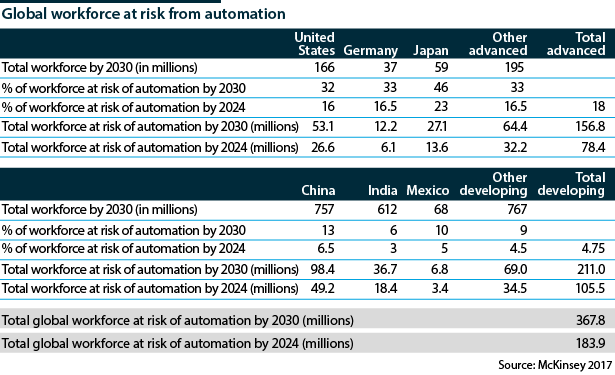Future workers will need to adapt continuously
20th century models of education and training are rapidly becoming obsolete
With the rise of digital platform-based businesses, project-based work and telecommuting, jobs are becoming more mobile, offering people options that differ significantly from the typical 20th century linear, single-employer path.
What next
Technology-induced economic changes increasingly require workers to combine flexibility with specialism, and sophisticated social skills with advanced cognitive abilities. However, education systems for future workers and retraining programmes for existing workers are slow to adapt -- as are social protection policies for workers at risk of technological stranding.
Subsidiary Impacts
- Flexible work will enable -- and in some cases pressure -- workers to continue working into their 70s and even 80s.
- Generations nurtured in an older style of education and work experience cannot be abandoned without serious political consequences.
- The changing nature of work will increase the demand for and economic returns on tertiary education.
Analysis
The nature of work is changing rapidly (see PROSPECTS 2019-23: Future of work - December 3, 2018).
Platform workers
Global platform-based businesses connect employers and workers to perform specific tasks. For more complex projects, other platforms provide the governance to engage multiple work suppliers.
The common denominator is that participants engage in contingent work as independent contractors for work delivered mainly online. The management of projects normally resides with the employer or sometimes within the online platform that underpins the service.
Almost all net employment growth in the United States since 2005 appears to have been in alternative work arrangements: part-time, freelance, gig jobs and a patchwork of contingent work outside full-time employment.
Such independent specialists have become important to businesses for one-time, specialised services. These 'super temps' pursue project-based careers independent of any single organisation, and frequently earn comparable remuneration besides having the autonomy and flexibility.
Telecommuters
Twenty years ago, telecommuters performed relatively routine work, such as data entry or telemarketing. However, with the evolution of virtual technology, telecommuters increasingly perform professional-level activities across organisational hierarchies or geographical boundaries:
Thanks to digital communication technology teams collaborate more effectively in real time, as virtual meetings can be held at any time and location. Companies manage projects more effectively, especially when functional expertise for projects resides in different parts of the organisation or when in-house project teams collaborate extensively with external talent.
Office design architects note that 25%-40% of employees are not in the office at any one time; movable workstations and assignable locations save significant amounts of office space and rent. From the employees' perspective, telecommuting can enable more control over daily schedules and work demands, in some cases reducing the level of work-family conflicts.
Research shows that telecommuting has downsides: notably, the loss of direct social interactions and professional networks. Moreover, success in telecommuting requires self-discipline and comfort in working more independently and retrain constantly.
Project-based workers
Improved technology is taking over routine tasks previously carried out by large bureaucracies. Consequently, staff are moving into special project teams addressing the exceptions that escape the automated systems and solving the new problems that arise.
Just as automation took over routine manufacturing tasks -- ie, those following an explicit set of rules, such as assembling a part -- artificial intelligence is increasingly doing the same for routine white-collar work.
US lawyers who used to scan thousands of documents relevant to a legal procedure have been replaced by computers, as have radiologists scanning x-ray images; automated systems now throw up more challenging items that are reviewed by lawyers and physicians.
Many such professionals need not be in the same organisation, or in any organisation. INSEAD's research concludes that the combination of connectedness and organisational modularity are fuelling the rise of contingent workers who do not have an implicit or explicit contract for ongoing employment.
Flexibility plus specialism
Much of today's educational structure was designed for 20th century factories
As the economy changes, workers will need more specialisation to be employable, but at the same time they will need the flexibility to navigate non-linear careers. To combine flexibility with specialisation, workers will need to retrain continuously.
Flexibility builds on the ability to learn how to learn, especially self-directed learning. This appears to be moulded in the early stages of education. Academic research shows that people with only deep vocational skills show less adaptability and therefore diminished employment prospects later in life; these are the people being left behind in the new economy.
The World Bank's more recent report has echoed this conclusion: the ability to adapt quickly to change is increasingly valued by the labour market. The sought-after trait is the ability to respond to unexpected circumstances and to relearn quickly.
This requires a combination of certain cognitive skills (such as critical thinking and problem-solving) and interpersonal and behavioural skills (curiosity and creativity).
Cognitive plus social skills
About one-third of all jobs require non-routine cognitive skills and social abilities
As routine non-manufacturing tasks get transferred to machines and automated processes, the World Bank finds that the demand for workers who can undertake non-routine, cognitive tasks is increasing, as is the demand for workers able to handle manual tasks that cannot be automated easily, such as food preparation.
According to World Bank data, between 2001 and 2018, the share of employment in occupations intensive in non-routine cognitive and social/behavioural skills has increased to 41% from 33% of total employment in advanced economies and to 23% from 19% in emerging economies.
Consequently, the demand for social skills is rising. Employers routinely list teamwork, collaboration and communication skills as among the most valuable yet hard-to-find qualities of workers.
A 2017 academic study based on thousands of individuals over 30 years finds that the returns for social skills are significant even after taking account of cognitive skills; and that cognitive and social skills are complementary. Social skills are those that require coordination among co-workers, negotiations, persuasion and social perceptiveness.
Jobs that require combined high levels of cognitive skill and social skill have fared particularly well; in contrast, high math, low social skill jobs have fared especially poorly. According to this study, increasing social skills by one standard deviation raises wages by 5% to 10%.
Moreover, the social skills content of US jobs increased 24% from 1980 to 2012; although the returns to these skills did not increase over time, the number of occupations requiring them jumped to such an extent that the association between social skills and full-time work increased more than four times..
Policy reform
The changing skills demand requires policy reform in key areas.
Education
Education systems to focus on teaching future generation of workers how to learn, rather than on absorbing facts and methods. However, reforms are uneven (see AFRICA: Future will hinge on closing skills gap - December 28, 2018).
Formal programmes for adults already in the workforce would also need to adapt mainly because adults learn differently, they learn more slowly, and they face more outside stresses. Yet most formal programmes are not designed for these conditions.
Welfare
The shifting labour market means that many people will lose their jobs and may fall into poverty, absent social protections. The European Commission holds up the Danish model of 'flexicurity' as a model, which provides benefits such as unemployment insurance and re-training.
This model is not suited to every country (see FRANCE/EU: Economy will shape Macron’s euro-area plans - September 21, 2017). Yet without creative and varied approaches, many workers are likely to be left without the skills needed in the new economy, risking widespread social and political consequences (see INT: Social cohesion is vital to inclusive growth - November 8, 2018).

